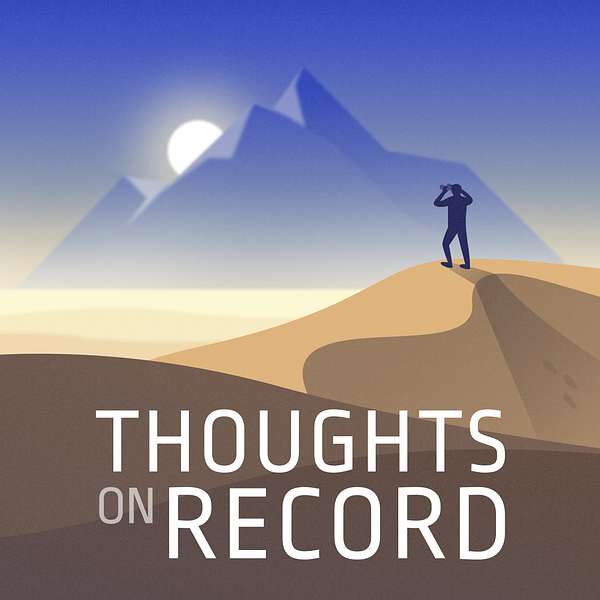
Thoughts on Record: Podcast of the Ottawa Institute of Cognitive Behavioural Therapy
Thoughts on Record is the podcast of the Ottawa Institute of Cognitive Behavioural Therapy (OICBT) located in Ottawa, Ontario, Canada. Each week we explore topics relevant to clinicians and mental health consumers from a cognitive behavioural perspective; however, if you’re generally interested in psychology, psychotherapy, evolutionary psychology, mental health, the brain, dynamics of human behaviour, creativity, wellness & performance then this podcast will certainly be of interest to you. Thoughts on Record is hosted by OICBT clinical psychologist Dr. Pete Kelly, C. Psych. Dr. Kelly is a Clinical Professor in the School of Psychology at the University of Ottawa and Adjunct Research Professor in the Department of Neuroscience at Carleton University. In addition to his clinical work, Dr. Kelly is actively involved in directing speciality programming at OICBT, teaching and supervision, providing workshops to mental health professionals and is a frequent speaker to organizations around the impact of stress on well-being. Email the show: oicbtpodcast@gmail.com. You can visit the OICBT at www.ottawacbt.ca. Original theme music courtesy of OPK5, outro music courtesy of Baldhero & Van Whelan https://baldherovanwhelan.bandcamp.com
Thoughts on Record: Podcast of the Ottawa Institute of Cognitive Behavioural Therapy
Dr. Maelisa McCaffrey - Clinical Documentation
Comments or feedback? Send us a text!
🎙️ Episode Overview
Clinical documentation: every therapist’s frenemy. For many mental health professionals, paperwork is one of the most persistent sources of stress—filled with contradictory advice, defensive writing habits, and the ever-present fear of audits or legal scrutiny. Add to that an endless backlog of notes and inconsistent training, and it’s no wonder documentation can feel more like a burden than a cornerstone of good clinical care.
With the rise of AI-powered tools—from automated note generation to smart treatment planners—clinicians are hopeful for relief. But new tools bring new questions: What’s ethical? What’s secure? And when does AI truly enhance care, rather than just speed up a flawed process?
Dr. Maelisa McCaffrey, licensed psychologist and founder of QA Prep, joins us to explore the evolving landscape of clinical documentation, how to write better notes with less stress, and how to use AI responsibly while maintaining human-centered care.
💡 Key Themes & Questions
- What are the biggest misconceptions about what needs to be included in clinical documentation?
- The most common documentation pitfalls among early-career therapists—and how to course-correct.
- Finding the balance between clinical thoroughness and legal protection.
- How to tailor documentation to its intended audience—billing, risk management, continuity of care, etc.
- Using documentation as a therapeutic tool, not just an administrative task.
- Key documentation strategies for high-risk situations (e.g., suicidality, child protection).
- How trauma-informed principles can guide respectful and non-stigmatizing notes.
- Best practices for open notes and client portals—writing transparently while maintaining clinical utility.
- Navigating couples and family therapy notes where multiple perspectives intersect.
- The impact of AI tools (scribes, generators) on documentation quality and clinician workload.
- Ethical and practical considerations when integrating AI into clinical workflows.
- Why clinicians must remain the final editors of AI-assisted notes.
- The future of AI in clinical outcome tracking and safety monitoring.
- Addressing concerns about liability and false confidence in AI-generated documentation.
- If Maelisa could change one thing about how clinicians approach documentation—it would be what?
🧠 Guest Bio
Dr. Maelisa McCaffrey, Psy.D. is a licensed psychologist, nail design enthusiast, and multi-passionate entrepreneur. Through her company QA Prep, she helps therapists transform documentation from a source of dread into a meaningful part of clinical practice. Maelisa focuses on the why behind documentation standards, helping clinicians think critically and ethically while maintaining their authenticity. Living with ADHD herself, she brings humor, practicality, and real-world insight to her trainings, empowering therapists to write notes with confidence and clarity.
🔗 Connect with Dr. McCaffrey
- Website: QA Prep
- YouTube: QA Prep Channel
- Instagram: @maelisamccaffrey
- LinkedIn: Dr. Maelisa McCaffrey